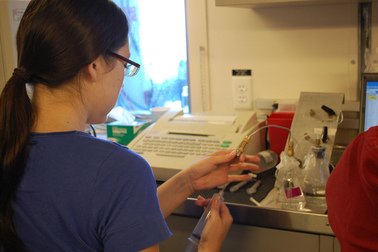How to Get Involved in Research: A Guide for College Scientistas

Spring 2011
By Saraf Nawar As an institution known for its cutting-edge research in the sciences, Harvard is ripe with research opportunities for its students to partake in. Yet, even with so many opportunities out there, often the road to finding the right research lab and the right experiment for oneself can seem a treacherous one. But the journey often leads to unexpected results, and, as life science research advisor Ann Georgi tells us, if approached correctly, one may just find a hidden gem amongst the many research labs at Harvard. No Experience Necessary Have no previous research experience? No problem, says Georgi, noting that students should not feel intimidated, even if they have not worked in a laboratory before. “Even the best scientists at Harvard had to start somewhere. Students should never think that no one wants them in their lab. For the vast majority of faculty, previous lab experience matters less than being able to express a genuine interest in the lab’s work and convey that you are someone who will be intellectually engaged in the lab,” she says. When to Begin So, as many freshmen may be wondering, when is the “right” time to dive into research? “It depends,” says Georgi, “the answer is different for each individual student.” But for those planning ahead and aiming for graduate school, Georgi has a few suggestions. “Working backwards, if you want to write a senior thesis, you should plan to be in your thesis lab by the fall of your junior year. The following summer [when you are a rising senior] is an ideal time to work intensively on the research for your thesis. Your rising junior summer is a good time to begin work in a lab either here at Harvard or seek an opportunity in a lab abroad. This is a good time to explore research abroad because you will have done some upper-level coursework and had some lab experience either through your courses or in a lab. Many students choose to start in either the fall or spring of sophomore year. Keep in mind however, that since you may still be taking lab intensive courses, you will have limited time to commit to the lab during the term. “ How Soon is Too Soon? What about getting started freshman year? As Georgi notes, students should not feel pressured to start research work right away, especially during the fall of freshman year. “We usually don’t encourage that, since students need time to get acclimated to the college environment,” she says. However she also encourages students to explore different paths in their freshman year, even during the summer after freshman year. “If you are uncertain about pursuing a concentration in science or some other area, you should find ways to explore all the possibilities. The summer following freshman year is a good time to explore different fields.” But for those hoping to enter research, Georgi says that there are many ways to go, but she recommends participating in summer programs such as PRISE (Program for Research in Science and Engineering).“We try to ensure that every student has the opportunity to receive funding for summer research. As long as the student has a found a position in a lab and presents a valid project proposal, they will have that opportunity.” Georgi stresses the importance of not just finding a lab, but writing a cogent project proposal, so that students may secure these sources of funding for the summer. She also suggests students wait until their sophomore year to apply to programs abroad, since such programs assume that students have had some research experience, as well as advanced coursework. Page 1 | Page 2 About the Author
Saraf Nawar
Harvard '14 I'm currently a Harvard sophomore studying chemistry & physics, and also am involved in research in electronic devices and materials science. I love math, and this summer I am very excited to be teaching one of my all-time favorite topics in math - linear algebra - which has amazing applications in many fields. I also served co-chair of the WISHR student resources committee. |
The Scientista Foundation, Inc. All Rights Reserved © 2011-2021 | Based in NY | [email protected]
The Network for Pre-Professional Women in Science and Engineering
The Scientista Foundation is a registered 501(c)(3) -- Donate!
The Network for Pre-Professional Women in Science and Engineering
The Scientista Foundation is a registered 501(c)(3) -- Donate!
